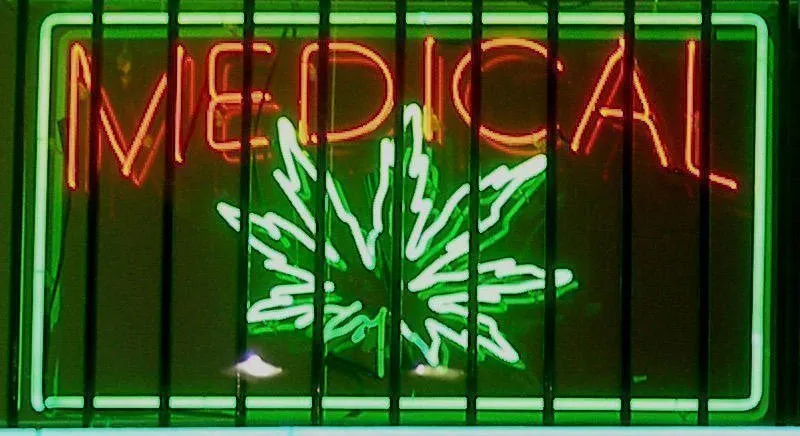Grayson County’s State Representative Samara Heavrin was one of 23 Republicans who, along with 20 Democrats, cosponsored the bipartisan House Bill 136 to legalize medical marijuana.
“Kentucky House Passes Bill to Legalize Medical Marijuana,” reported Associated Press’s Bruce Schreiner.
Schreiner continued: “The Kentucky House endorsed legalizing medical marijuana, passing a bill Thursday to strictly regulate the use of cannabis for a list of eligible medical conditions. The high-profile measure cleared the Republican-dominated House on a 59–34 vote after a long and occasionally emotional debate. The years-long debate now shifts to the GOP-led state Senate on whether Kentucky should join the majority of states allowing medical marijuana.”
Supporters said medical marijuana would ease the suffering of many Kentuckians.
“Eric Crawford, a steadfast medical marijuana advocate in Kentucky, has told lawmakers that he uses medical marijuana as an alternative to opioids to deal with pain and muscle spasms from injuries he suffered in a vehicle crash more than two decades ago. ...
“Opponents said they worry that Kentucky’s cannabis policy would become more lenient over the years if medical marijuana gets a legal foothold. That would worsen drug addiction woes, they said.
“Under the bill, doctors could prescribe medical cannabis for a specified list of conditions that include cancer, multiple sclerosis, chronic pain, epilepsy and chronic nausea. The House amended the bill to add post-traumatic stress disorder to the list of approved conditions for medical marijuana.”
HB 136 was assigned to the Senate Health and Welfare Committee, but it was never given a hearing. Senate President Robert Stivers told The Courier Journal that he “remains opposed to legalizing medical marijuana, saying that while he’s seen research showing marijuana could have a positive effect on patients with spasticity, nausea and joint inflammation, he says those studies had small sample sizes and duration — while he’s seen others showing negative side effects.”
In 2020, the Kentucky House passed a similar bill to legalize and regulate medical marijuana. That bill also died in the Senate without a committee hearing or vote.
U.S. News & World Report ranks Kentucky the 46th healthiest state in the nation. There is strong support for medical marijuana here in Kentucky. A poll from the Foundation for a Healthy Kentucky says nine in 10 adults support legalization.
Recreational marijuana is legal for adults in 18 states and Washington, DC. Medical marijuana is legal in 38 states and DC.
The rise of Delta-8
While Kentucky lawmakers are stuck at an impasse over medical marijuana, a new type of cannabinoid is making the scene. According to the U.S. Food & Drug Administration: “Delta-8 tetrahydrocannabinol, also known as delta-8 THC, is a psychoactive substance found in the Cannabis sativa plant, of which marijuana and hemp are two varieties. Delta-8 THC is one of over 100 cannabinoids produced naturally by the cannabis plant but is not found in significant amounts in the cannabis plant. As a result, concentrated amounts of delta-8 THC are typically manufactured from hemp-derived cannabidiol (CBD).
“Delta-8 THC products have not been evaluated or approved by the FDA for safe use and may be marketed in ways that put the public health at risk. [In reports the FDA has received,] adverse events included, but were not limited to, hallucinations, vomiting, tremor, anxiety, dizziness, confusion, and loss of consciousness.
“Delta-8 THC products often involve use of potentially harmful chemicals to create the concentrations of delta-8 THC claimed in the marketplace. The natural amount of delta-8 THC in hemp is very low, and additional chemicals are needed to convert other cannabinoids in hemp, like CBD, into delta-8 THC (i.e., synthetic conversion). Some manufacturers may use potentially unsafe household chemicals to make delta-8 THC through this chemical synthesis process. ... The final delta-8 THC product may have potentially harmful by-products (contaminants) due to the chemicals used in the process.”
The KYGA takes up Delta-8
In February 2022, State Sen. Paul Hornback (R-20) introduced Senate Bill 170 to prohibit production of intoxicating hemp-derived products such as those that contain delta-8 THC.
Sen. Hornback explained, “According to industry experts, it [delta-8 THC] can be hallucinogenic, and it can be psychotropic. It’s not a naturally occurring substance. It can contain trace amounts of toxic chemicals used in the chemical process to make it. At the very least, it needs to be regulated.”
SB 170 was passed in the Senate with a vote of 23 – 13, but it was not assigned to a House committee for a hearing during the recent legislative session. It can be refiled for consideration in 2023.
I can’t help but wonder if there was some reciprocity involved. Like, the Senate refused to take up HB 136 to legalize medical marijuana, so the House refused to take up SB 170 to prohibit (or at least regulate) the production of delta-8 THC.
The end result is that everybody loses – especially the people of Kentucky. I know people with legitimate health problems who’d benefit enormously from medical marijuana. I know that some of those people, unable to obtain medical marijuana, now use delta-8 THC products.
According to cbdthinker.com: “Kentucky’s Department of Agriculture released a letter in April 2021 arguing that ‘delta-8 THC is a Schedule 1 controlled substance under federal law and Kentucky law.’
“The Kentucky Hemp Association filed a lawsuit against the state’s agriculture and police commissioners, arguing that delta 8 is legal under federal and state laws.
“A Kentucky judge ruled in favor of the Hemp Association on February 28, 2022, passing a temporary injunction that officially keeps delta-8 legal in the state.”
--30--
Written by Mark Heinz, an author and reporter living at Nolin Lake.







